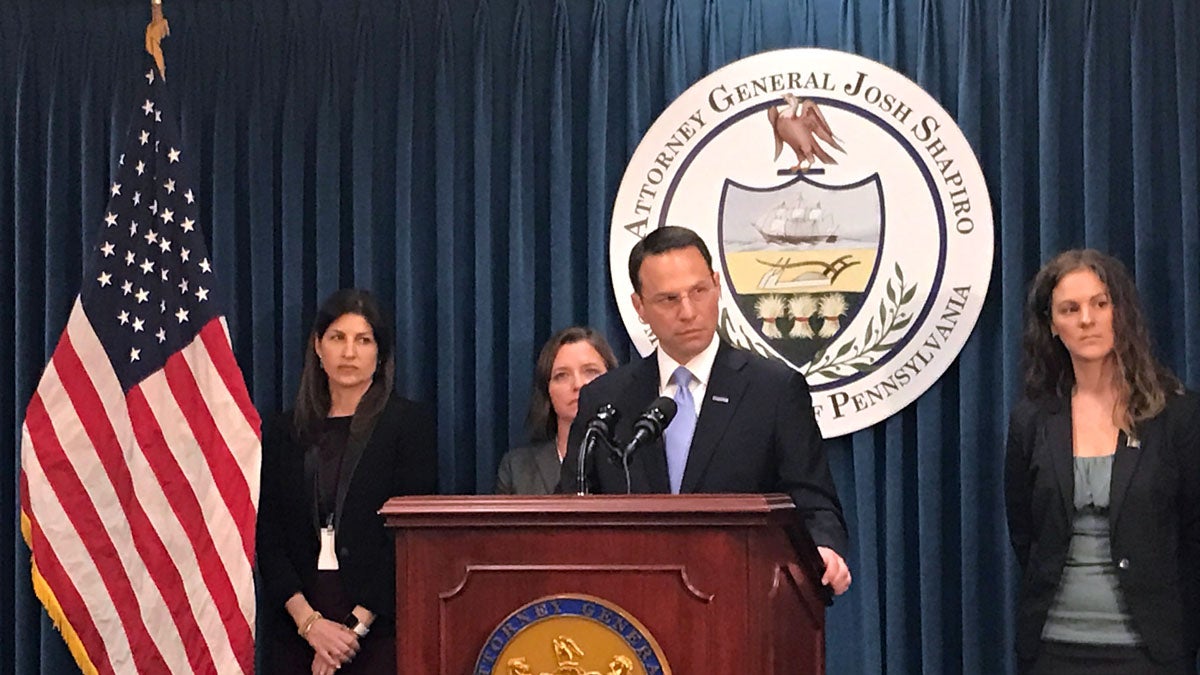Grand jury: No more charges in Harrisburg incinerator case, but state law should change

State Attorney General Josh Shapiro releases a report from the second grand jury convened to investigate the city of Harrisburg's financial disaster. (Emily Previti/WITF)
The second grand jury convened to investigate the city of Harrisburg’s financial crisis isn’t recommending more charges — but is calling for changes to state laws in its report just released by the state Attorney General’s office.
The 82-page report also sheds light on just how reckless some of the decisions were that led to the municipality’s ill-fated incinerator retrofit that responsible for the bulk of its massive debt.
Most notably, only about one third of nearly $435 million in debt issued for the incinerator was spent on the facility. Much of the rest went to lawyers and other professionals, bond insurers and public bodies for providing debt repayment guarantees they didn’t really have the will or ability to honor.
And the document contains witnesses’ testimony that former longtime Mayor Steve Reed was aware of project financing risks and strategic weaknesses to which he professed ignorance while under oath at state Senate hearings in 2012.
Finally, the conclusion of this case before the second grand jury is significant because now, a related civil lawsuit can move forward after years of preparation and waiting.
Background
Officials said repeatedly they hoped to make more arrests during the months after Reed was charged in 2015 with hundreds of counts of bribery, racketeering, theft and other offenses tied to his leveraging public money to finance a museum project.
Reed pleaded guilty earlier this year to taking 20 artifacts, which he contended was accidental, that had been purchased with public money for a museum that never opened.
By that time, the rest of the 499 counts against him had been dropped, mainly due to the statute of limitations having expired. Many discarded charges were linked to the political dysfunction and financial manipulation that brought Harrisburg to the brink of bankruptcy and under the first and only state takeover of a municipality in Pennsylvania.
In the report, the grand jury points to the dismissals to explain why it didn’t recommend additional charges.
Lingering questions
The state Attorney General’s office didn’t immediately respond Thursday to questions about the testimony in the grand jurty report contradicting Reed’s sworn statements in October 2012, less than five years ago.
Reed professed at the time he didn’t know until “after the fact” that the contractor Barlow had failed to obtain a performance bond, which provides some financial cover for municipalities. These bonds standard in public projects and the company’s inability to get one “should have been a red flag,” according to witnesses’ recent testimony before this grand jury.
It’s unclear what or when Reed was talking about when he said “after the fact” at the 2012 Senate hearings.
But James Barlow told state AG Agent Craig LeCadre more recently that Reed knew before November 2003 that the company wouldn’t be able to get a performance bond. The company’s contract wasn’t signed until New Years Eve 2003 and wasn’t formally closed until after bonds were issued in May 2004 to pay for the project, according to the grand jury report.
The report also says that none of the 10 attorneys questioned during those 2012 state Senate hearings took an oath prior to testifying. Both the legislators and lawyers say multiple times during those proceedings that attorneys don’t need to be sworn in, according to the hearing transcripts.
The report released Thursday doesn’t indicate who the grand jury believes was lying, if anyone, only that “the procedure was incorrect” and “all individuals providing testimony are witnesses and must be sworn as such.
“This is important because false estimony under oath may result in perjury or similar charges.”
What’s next
The report has several recommendations aimed at improving the lack of oversight and other issues that led to fiscal disaster in Harrisburg.
Two recommendations are to strengthen Pennsylvania public corruption laws.
First, by clarifying that the statute of limitations for public officials extends longer than it was interpreted to in Reed’s case. Second, empowering the state Attorney General to investigate local officials without the currently requisite handover of the case by the county District Attorney.
“Too much time passed” in this case, Attorney General Josh Shapiro says, while District Attorney Ed Marsico, who’s currently running for Dauphin County judge, reviewed the case.
Marsico got the case in February 2013. It was more than a year before he handed it over to then-Attorney General Kathleen Kane, whose own fall from grace undoubtedly thwarted the case’s progress at times.
The release of this report comes on Shapiro’s 100th day in office.
Shapiro declined to provide more details on the grand jury that released today’s report, but did confirm it is separate from the first Pittsburgh-based panel that recommended charges against Reed in 2015.
Editor’s note: This is a breaking news story and will be updated.
WHYY is your source for fact-based, in-depth journalism and information. As a nonprofit organization, we rely on financial support from readers like you. Please give today.



